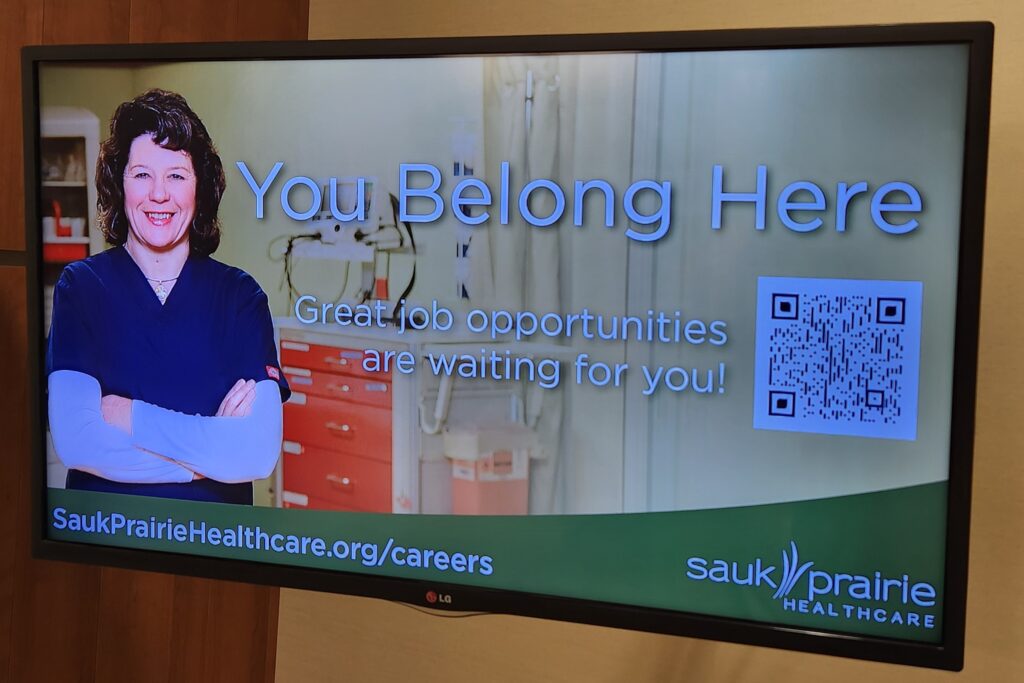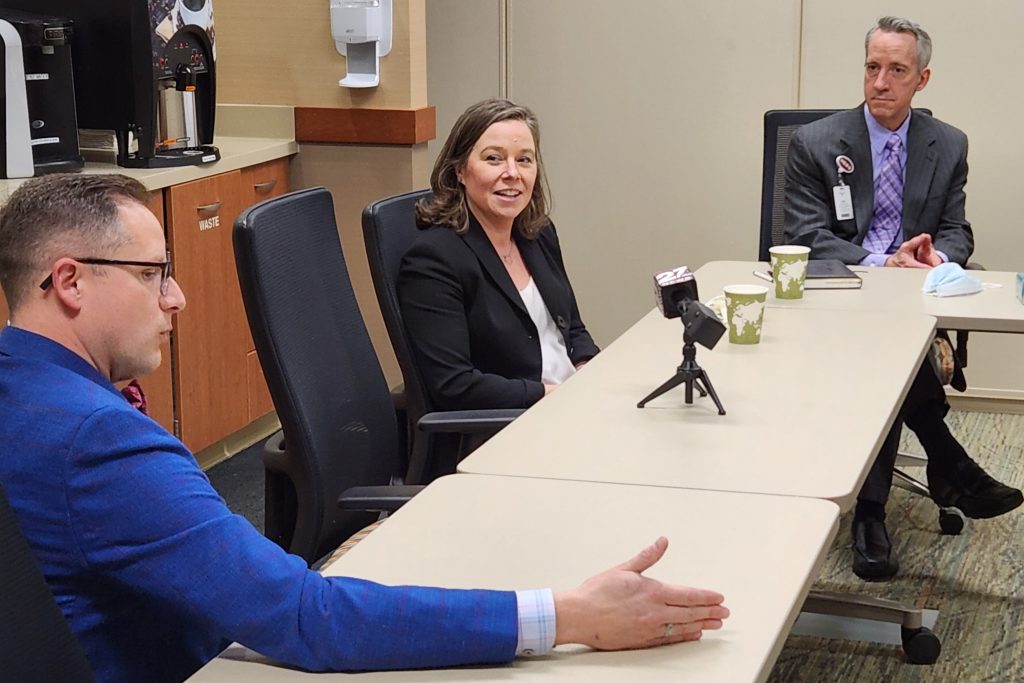Evers Task Force to Spotlight Health Care Worker Shortage
Everyone in state should have good quality care, 'no matter their zip code.'

This recruiting message shows up among a series of rotating messages about services and recent additions to the Sauk Prairie Healthcare staff. The screen that displays them greets visitors inside the entryway at Sauk Prairie Hospital. (Erik Gunn | Wisconsin Examiner)
Following through on one of the announcements in his State of the State message a week ago, Gov. Tony Evers established a task force of cabinet officers and outside experts Monday to examine the shortage of health care workers in Wisconsin.
Lt. Gov. Sara Rodriguez, who worked as an emergency room nurse and in health care policy and public health before she entered politics, will chair the task force. Its primary objective will be to develop proposals to help shape the health care and workforce agendas for the state’s 2025-27 budget. The task force report is due Sept. 1. The administration will present the state’s draft budget in February 2025.
Her visit capped a day of events starting with a press conference in Appleton at Fox Valley Technical College with Evers, Rodriguez, Department of Workforce Development (DWD) Secretary-designee Amy Pechacek and Department of Health Services (DHS) Secretary-designee Kirsten Johnson.
Nursing, other health care fields lose workers
Announcing the task force, Evers cited a 2023 Wisconsin Hospital Association report that showed job vacancies jumped from 5.3% in 2020 to 9.9% in 2021. A Department of Workforce Development report in May 2022 forecast a shortage of 20,000 nurses in Wisconsin by 2040.
The shortage of health care workers extends nationwide. Evers’ announcement cited a National Council for State Boards of Nursing report that 100,000 nurses left their jobs during the COVID-19 pandemic and that almost 900,000 said they would leave the health care workforce by 2027.
The task force follows Evers’ unsuccessful attempts to win support from the Republican majority in the Legislature for a package of workforce proposals, several focused on health care.
After most of the governor’s original workforce-related proposals were left out of the final 2023-25 state budget, he proposed a special session bill to address child care and other workforce-related issues. Those included a $100 million proposal to support grants for training health care workers and to address other obstacles that keep people out of the workforce, such as child care access. Another $60 million in the package was to have gone toward a half-dozen other health care training proposals.
Following the Appleton press conference Monday, Evers and the two cabinet secretaries visited Gateway Technical College in Kenosha and the Health Science Center at Southwest Technical College in Fennimore.
A wide-ranging agenda
Rodriguez visited the Medical College of Wisconsin’s Central Wisconsin campus in Wausau before traveling to Sauk Prairie Hospital.
At the hospital, Shawn Lerch, CEO of its parent corporation, Sauk Prairie Healthcare, took Rodriguez on a tour of the building with stops to chat with nurses and with the hospital manager.

Dr. Nathan Grunewald, a urologist who grew up in Sauk County and returned to practice at Sauk Prairie Health Care, speaks with Lt. Gov. Sara Rodriguez about concerns relating to recruiting and keeping health care workers. Looking on is Sauk Prairie Healthcare CEO Shawn Lerch. (Erik Gunn | Wisconsin Examiner)
A round-table conversation with some of the managers followed, which covered efforts to recruit a variety of professionals to the rural community as well as some of the ways in which Sauk Prairie has sought to fill hiring gaps. Rural hospitals’ particular challenges are an important part of the picture, Rodriguez said.
Rodriguez also told the gathered managers about initiatives that the Evers administration has helped launch to address hiring gaps. One is a Madison College-UW Health nursing pilot apprenticeship program that allows certified nursing assistants (CNAs) to take classes and go through their clinical training while getting paid, a requirement under state-licensed apprenticeships.
“I can’t imagine working full time and trying to go to nursing school,” Rodriguez said.
In an interview after the discussion, Rodriguez said the new task force aims to get a broad array of perspectives on both the scope of the health care workforce shortage as well as its causes and remedies.
“What we really wanted to do was to make sure we were getting information from different sectors within health care,” Rodriguez said. “Because we know, and we heard today, that there are issues within nursing. But there are also issues within surgical technology. I know when I’ve spoken to dentists, they struggle with being able to hire dental hygienists.”
To address problems in various health care sectors, the task force will “make sure that we can talk to everybody all across the state of Wisconsin.”
Besides a wide range of health care professions, the task force will include representation from universities and technical colleges. After pinpointing more details about staffing shortages across a range of health care professions, Rodriguez said, the task force will look for “some innovative solutions that are working out in Wisconsin, and then give those recommendations to the governor.”
Rodriguez highlighted a 2022 state law that allows discharged military veterans trained in certain health care fields to begin practicing in Wisconsin while awaiting their license as the sort of policy that could emerge. “All of those types of solutions are on the table to be implemented so that we can address the shortages that we have,” she said.
Recommendations might be for new legislation or budget proposals, but they could also lead to practices that the administration could implement directly. Johnson and Pechacek will serve as co-chairs of the task force “to make sure that, if we have administrative solutions, they are going to be able to implement them within their divisions,” Rodriguez said.
One measure that has repeatedly foundered would be to expand Medicaid, called BadgerCare in Wisconsin, under the Affordable Care Act. In Wisconsin, the program is largely only available to people with incomes at or below the federal poverty guideline. In return for expanding it to cover people with incomes up to 138% of the poverty guidelines, the federal government would pay an additional subsidy to the state.
Rodriguez wants to see that change because Medicaid expansion would bring “billions of dollars into the state of Wisconsin that we can use to be able to help with health care overall,” she said. “And so it just makes absolute sense that we should expand BadgerCare.”
Rodriguez said she believes the task force can make a difference despite the Legislature’s previous rejection of Evers’ proposals.
“This is an emergent issue that we have here in Wisconsin. People in our communities know that we do not have the staffing levels we need,” she said.
“So we’re going to have to address this now, so people can get the care that they need,” she added. “And this is a bipartisan problem. We all need to be able to access health care at some point in time, so these solutions need to be implemented today so that we can offset that shortage tomorrow.”
Evers task force to spotlight health care workforce shortages was originally published by Wisconsin Examiner.





















